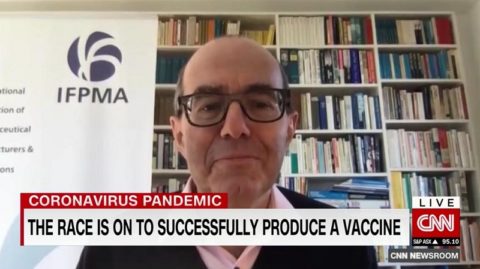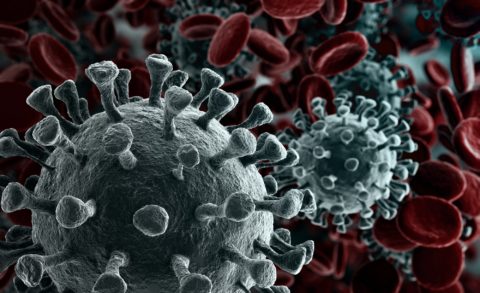Published on Thomas Cueni’s LinkedIn profile.
COVID-19 is not business as usual for any of us, especially not for the pharmaceutical industry.
As we enter into the sixth month of the COVID-19 pandemic, I think it is no understatement to say that the global biopharmaceutical industry has been at the forefront of efforts from day one. In the past months, rarely a day has gone by without an announcement of a pharma company joining the race to develop COVID-19 drugs and vaccines.
One of the reasons we have been able to respond at such a speed is that we can count on a flourishing innovation environment. Because our innovation, thankfully we are not starting from scratch. We can repurpose treatments and build from existing vaccines technologies. The rapid mobilization of companies joining forces with others on multiple technologies to find successful vaccines is unheard of.
I have been working for this industry for the past 30 years, and I have never seen so many companies putting aside their normal and necessary competitive approaches and instead joining forces to share knowledge, technologies and resources to do all they can to hopefully find a safe vaccine in record time. As Albert Bourla, CEO at Pfizer, said “We are not rivals, we are competitors. The only rivals are the virus and time”. All us share a deep sense of responsibility to ensure that no one is left behind. Therefore, the notion of equitable, available and affordable access to a COVID-19 vaccine is at the heart of what we are doing. It’s not just one company committing to this, its not just one university or public body – we are one-team. This is what we heard loud and clear from industry leaders last week.
It’s a case of all hands on deck to find a COVID-19 vaccine.
I invite you to watch and share the global media briefing of 28 May. I was joined by CEOs and CSOs from AstraZeneca, GSK, Johnson & Johnson and Pfizer to give an update on R&D for COVID-19 vaccines and the on-going preparations for scaling up production capacity, ensuring continuous supply and fair distribution.
Companies are testing various technologies in the race to find a COVID-19 vaccine. GSK is working with its pandemic adjuvant technology, Pfizer chose the messenger RNA technology, AstraZeneca is collaborating with the University of Oxford and Johnson & Johnson is building on its experience of developing an Ebola vaccine.
Every single company is committing huge resources and is making enormous, risky investments decisions in a totally unprecedented manner to hopefully bring an effective vaccine to the market next year.
Acknowledging the challenges ahead
We have good hope to find a COVID-19 vaccine, but the challenges should not be underestimated. Even before we are sure to find a vaccine, we must look at how we can scale up manufacturing. As Bill Gates said, if we can only produce 300 million doses in one manufacturing site, then there will be a scramble and things will get very difficult, but if we can get ten sites built so that 3 billion or more doses can be produced, then we will be able to make sure those who need the vaccine first will get it. Realistically, for everybody to get a vaccine, we might need around 12-15 billion doses of a vaccine, and today the five or six biggest vaccine manufacturers produce in total less than half of this volume in a year… The good news is that companies are already now – without even knowing whether their respective vaccine will turn out to be effective – pulling out all the stops to see how they can help produce billions of vaccine doses.
It’s not just a matter of producing billions of doses of vaccines but you also need to produce billions of glass vials which contain the vaccine; and we will need to have the logistics in place to distribute them. Companies are already looking ahead to try and find solutions to potential bottle necks. Given that availability of glass vials may be a bottleneck, one solution could be to have five or ten doses in a vial rather than producing the usual single-dose vaccines.
Conducting clinical trials and achieving reliable outcomes may become more difficult as countries are making progress to flatten the curve and trial participants are possibly no longer exposed to a certain risk of infection which is necessary to prove a vaccine is indeed effective.
Another challenge is also the storage and shipping requirements. Some vaccines require minus 80 degrees Celsius and some countries, particularly lower-income countries, lack the necessary infrastructure to store such vaccines. Therefore, companies are exploring options that do not require such extreme temperatures.
An unprecedented task at hand – but pharma is ready to take it on
Never before has there been so much hope placed in finding safe and effective vaccines. The task at hand is larger than any attempted before and beyond the power of any single entity. Pharma is stepping up to the plate, working in totally unchartered territory, acknowledging the exceptional circumstances and the public health crisis of this pandemic. This is not a “business as usual” approach – this is an unheard-of approach needed to respond to a global pandemic.
We are confident that a vaccine will make it to the finish line and the race is clearly on: there are currently 10 vaccines in clinical trials and 123 candidate vaccines in pre-clinical evaluation. This is amazing and we should acknowledge the tremendous efforts that scientists, both from the public and private sector, are undertaking at the moment to save millions of people from COVID-19.









